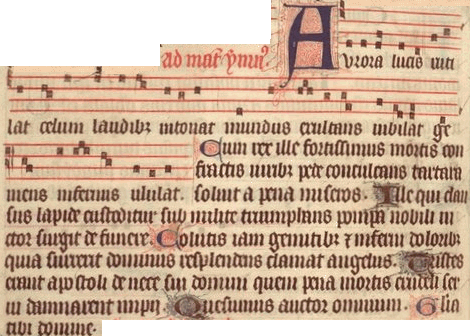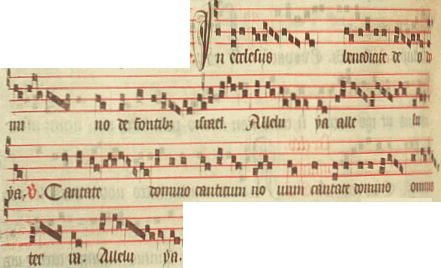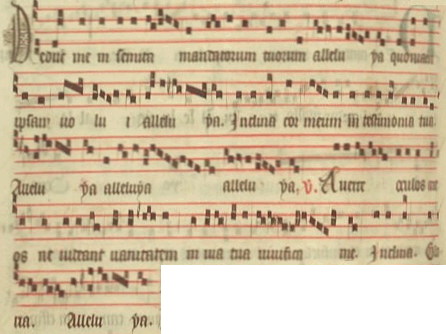Even Years: Leo the Great, Treatise 73, 1-2 (CCL 138 A, 450-452)
| Post beatam et gloriosam
resurrectionem domini nostri Iesu christi, qua uerum dei templum Iudaica
impietate resolutum diuina in triduo potentia suscitauit, quadragenarius hodie,
dilectissimi, sanctorum dierum expletus est numerus, sacratissima ordinatione dispositus,
et ad utilitatem nostrae eruditionis inpensus, ut dum a domino in hoc spatio
mora praesentiae corporalis extenditur, fides resurrectionis documentis
necessariis muniretur.
| After the blessed and glorious Resurrection of our Lord Jesus Christ, when the divine power in three days raised the true Temple of God which Jewish wickedness had destroyed, on this very day, dearly beloved, the number of the forty holy days is completed. While the Lord draws out the time of his bodily presence, our faith in his Resurrection is being strengthened by the necessary signs.
| | Mors enim christi multum
discipulorum corda turbauerat, et de supplicio crucis, de emissione spiritus,
de exanimati corporis sepultura, grauatis maestitudine mentibus quidam
diffidentiae torpor obrepserat. Nam cum sanctae mulieres, sicut euangelica
pandit historia, reuolutum a monumento lapidem, sepulchrum corpore uacuum, et uiuentis
domini testes angelos nuntiarent, uerba earum apostolis aliis que discipulis
deliramentis similia uidebantur. Quam utique haesitationem humana infirmitate
nutantem, nequaquam permisisset spiritus ueritatis praedicatorum suorum inesse
pectoribus, nisi illa trepida sollicitudo et curiosa cunctatio nostrae fidei
fundamenta iecisset. Nostris igitur perturbationibus, nostris periculis in
apostolis consulebatur, nos in illis uiris contra calumnias impiorum, et contra
terrenae argumenta sapientiae docebamur, nos illorum instruxit aspectus, nos
erudiuit auditus, nos confirmauit adtactus. Gratias agamus diuinae
dispensationi et sanctorum patrum necessariae tarditati. Dubitatum est ab
illis, ne dubitaretur a nobis.
| The Death of Christ had greatly disturbed the hearts of the disciples. When the holy women, as the Gospel story has told us, proclaimed that the stone had been rolled away from the tomb, the sepulchre was empty, and that angels were witnesses of the living Lord, their words seemed to the Apostles and other disciples as pure nonsense.
The Spirit of Truth would by no means have permitted this wavering in human weakness to enter the hearts of his preachers, if their trembling anxiety and questioning delay were not to have established the foundations of our faith. Consequently, it was our doubts, our danger, that was being considered in the Apostles. We, in the guise of the Apostles, were being instructed against the slanders of the wicked and the proofs of earthly wisdom. Let us give thanks for necessary slowness of the Holy Fathers. They doubted so that we need not doubt.
| | Non ergo dies hi, dilectissimi, qui
inter resurrectionem domini ascensionem que fluxerunt, otioso transiere
decursu, sed magna in eis confirmata sacramenta, magna sunt reuelata mysteria.
| These days, dearly beloved, between the Resurrection of the Lord and his Ascension provided the opportunity to confirm great mysteries, to reveal great secrets.
| | In his metus dirae mortis aufertur,
et non solum animae, sed etiam carnis inmortalitas declaratur. In his per insufflationem
domini infunditur apostolis omnibus spiritus sanctus, et beato apostolo Petro
supra ceteros, post regni claues, ouilis dominici cura mandatur. In his diebus,
duobus discipulis tertius in uia dominus comes iungitur, et ad omnem nostrae
ambiguitatis caliginem detergendam, pauentium ac trepidantium tarditas
increpatur. Flammam fidei inluminata corda concipiunt, et quae erant tepida,
reserante scripturas domino, efficiuntur ardentia. In fractione quoque panis
conuescentium aperiuntur obtutus, multo felicius horum oculis patefactis,
quibus naturae suae manifestata est glorificatio, quam illorum generis nostri
principum, quibus praeuaricationis suae est ingesta confusio.
| In these days the Holy Spirit was poured into all the Apostles by the breath of the Lord; and to blessed Peter above all the others, after the keys of the kingdom, the care of the Lord's sheep is entrusted. [In these days, the Lord joined the two disciples on the road, an to remove all cloud of doubt on our part, he rebuked the slowness of their fearful and trembling hearts. Their enlightened hearts caught the flame of faith, and when the Lord explained the Scriptures, their tepid hears became ardent. In the breaking of bread during the meal, their eyes were opened. That opening of eyes, to see the glorification of their nature manifested, was more blessed than the opening of the eyes of our first parents, when they saw the confusion arising from their sin.]
|
Odd Years: Augustine of Hippo, Treatise 2 on 1 John, 8,9,11,14 (SC 75, 166-181)
| Quomodo poterimus amare deum si amamus mundum? parat nos ergo inhabitari caritate. duo sunt amores, mundi et dei. si mundi amor habitet, non est qua intret amor dei. recedat amor mundi et
habitet dei; melior accipiat locum. amabas mundum; noli amare mundum. cum
exhauseris cor tuum amore terreno, hauries amorem diuinum, et incipit habitare
iam caritas de qua nihil mali potest procedere. audite ergo uerba purgantis modo.
| How can we love God if we love the world? There are two kinds of love, love of the world and love of God. Where love of the world is in possession, there is no room for love of God. Love of the world must give place to the higher love which is the love of God. You used to love the world; love it no longer. When you have emptied your heart of earthly love you will drink your fill of the love that is divine. Charity will now begin to dwell in you, and from charity no evil can come. Listen then to the words of the Apostle who would now make you clean and pure.
| | Quasi agrum inuenit corda
hominum. sed quomodo inuenit? si siluam inuenit, extirpat. si agrum purgatum
inuenit, plantat. plantare ibi uult arborem, caritatem. et quam siluam uult
extirpare? amorem mundi. audi extirpatorem siluae: nolite diligere mundum —hoc
enim sequitur— neque ea quae sunt in mundo. si quis dilexerit mundum, dilectio
patris non est in ipso. audistis quia si quis dilexerit mundum, dilectio patris
non est in ipso
| The human heart is like a field to him. In what condition does he find it? If it is overgrown, he weeds it, if the ground is already cleared, he plants it with charity, for charity is the tree he desires to establish there. The undergrowth he would eliminate is the love of the world. Listen to him as he roots up the brushwood, Love not the world, nor the things of the word. If anyone loves the world, the love of the Father is not in him.
| | Vis habere dilectionem patris ut
sis cohaeres filii? noli diligere mundum. exclude malum amorem mundi ut
inplearis amore dei. uas es, sed adhuc plenus es. funde quod habes ut accipias
quod non habes. certe iam renati sunt ex aqua et spiritu fratres nostri, et nos
ante aliquot annos renati sumus ex aqua et spiritu. bonum est nobis. non
diligamus mundum ne remaneant in nobis sacramenta ad damnationem nostram, non
firmamenta ad salutem. firmamentum salutis est habere radicem caritatis, habere
uirtutem pietatis, non formam solam. bona forma, sancta forma; sed quid ualet
forma si non teneat radicem?...
| Would you have the love of the Father, and so be a fellow heir with the Son? Love not the world. Reject the world's wicked love and be filled with the love of God. You are a vessel, but not yet an empty one; pour out what you contain, so that you may have room for what you do not yet possess. We know that our brothers have been born again of water and the Spirit, just as we ourselves were years ago. It is good for us not to love the world, otherwise the sacraments we then received may remain in us only as a sign of condemnation instead of a healing support.
| | Nolite diligere mundum nec ea
quae sunt in mundo quia omne quod in mundo est desiderium est carnis et
desiderium oculorum et ambitio saeculi. tria dixit quae non est ex patre sed ex
mundo est desiderio carnis temptatus est quando dictum est ei: si filius dei
es, dic lapidibus istis ut panes fiant, quando esuriuit post ieiunium. sed
quomodo repulit temptationem et docuit pugnare militem? adtende quid illi ait
non in pane solo uiuit homo sed in omni uerbo dei.
| Let us have no love for the world, or the things of the world. All that the world contains is the lust of the flesh, the lust of the eyes, and the pride of life. By these three things the devil tempted our Lord. He tempted him to lust of the flesh when he said to him: If you are the Son of God, tell these stones to turn into bread. Now take note of the method Jesus used to rebuff the tempter; it is the way he taught his followers to resist him. Man does not live by bread alone, he retorted, but by every word that comes from God.
| | Temptatus est et desiderio
oculorum de miraculo quando ei dixit: mitte te deorsum quia scriptum est:
angelis suis mandauit de te ut suscipiant te ne quando offendas ad lapidem
pedem tuum. ille restitit temptatori
| The devil also tempted our Lord to lust of the eyes for the sight of a miracle, when he suggested to him: Cast yourself down, for it is written, He has given his angels charge over you; they shall bear you up, in case you dash your foot against a stone. But Jesus refused to listen to the tempter.
| | De ambitione saeculi quomodo
temptatus est dominus? quando eum leuauit in excelsum et dixit ei: haec omnia
regna tibi dabo si prostratus adoraueris me. de elatione regni terreni uoluit
temptare regem saeculorum. sed dominus qui fecit caelum et terram diabolum
calcabat. quid magnum a domino diabolum uinci? quid ergo respondit diabolo nisi
quod docuit ut respondeas? scriptum est: dominum deum tuum adorabis et illi
soli seruies.
| And how did the devil tempt him to the pride of life? By taking him up onto a high mountain and telling him: All this will I give you if you will bow down and worship me. The prestige of an earthly kingdom as a bait for the King of the ages! But he who made heaven and earth trod the devil under his feet. Is there anything extraordinary in the fact that the Lord should get the better of the devil? The lesson for us is in the way he answered him; it is the way we too must answer. It is written, The Lord your God you shall worship, and him only shall you serve.
| | Tenentes ista non habebitis
concupiscentiam mundi. non habendo concupiscentiam mundi non uos subiugabit nec
desiderium carnis nec desiderium oculorum nec ambitio saeculi, et facitis locum
caritati uenienti ut diligatis deum, quia si fuerit ibi dilectio mundi non ibi
erit dilectio dei scripturas audiamus: ego dixi: dii estis et filii altissimi
omnes. si ergo uultis esse dii et filii altissimi, nolite diligere mundum nec
ea quae sunt in mundo et mundus transit et desideria eius. qui autem facit
uoluntatem dei manet in aeternum sicut et deus manet in aeternum.
| If you hold to that, you will not have lust for the world. If you have no lust for the world, the desires of the flesh, the desires of the eyes and the love of the world will not subjugate you. You will make way for charity to come in, su that you love God. For, if you love the world, you will not love God. Listen to Scripture: "I said you are all gods, and children of the Most High." Therefore, if you wish to be gods and children of the Most High, do not love the world and what is in th world. The world passes, along with its desires. B;ut he who does the will of God remains forever, just as God remains forever.
|
| |




